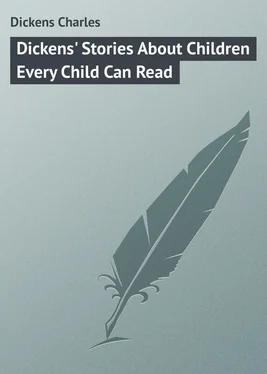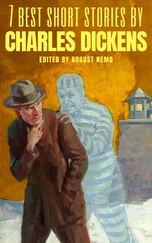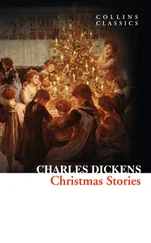Charles Dickens - Dickens' Stories About Children Every Child Can Read
Здесь есть возможность читать онлайн «Charles Dickens - Dickens' Stories About Children Every Child Can Read» — ознакомительный отрывок электронной книги совершенно бесплатно, а после прочтения отрывка купить полную версию. В некоторых случаях можно слушать аудио, скачать через торрент в формате fb2 и присутствует краткое содержание. Издательство: Иностранный паблик, Жанр: foreign_prose, на английском языке. Описание произведения, (предисловие) а так же отзывы посетителей доступны на портале библиотеки ЛибКат.
- Название:Dickens' Stories About Children Every Child Can Read
- Автор:
- Издательство:Иностранный паблик
- Жанр:
- Год:неизвестен
- ISBN:нет данных
- Рейтинг книги:4 / 5. Голосов: 1
-
Избранное:Добавить в избранное
- Отзывы:
-
Ваша оценка:
- 80
- 1
- 2
- 3
- 4
- 5
Dickens' Stories About Children Every Child Can Read: краткое содержание, описание и аннотация
Предлагаем к чтению аннотацию, описание, краткое содержание или предисловие (зависит от того, что написал сам автор книги «Dickens' Stories About Children Every Child Can Read»). Если вы не нашли необходимую информацию о книге — напишите в комментариях, мы постараемся отыскать её.
Dickens' Stories About Children Every Child Can Read — читать онлайн ознакомительный отрывок
Ниже представлен текст книги, разбитый по страницам. Система сохранения места последней прочитанной страницы, позволяет с удобством читать онлайн бесплатно книгу «Dickens' Stories About Children Every Child Can Read», без необходимости каждый раз заново искать на чём Вы остановились. Поставьте закладку, и сможете в любой момент перейти на страницу, на которой закончили чтение.
Интервал:
Закладка:
"Boots couldn't but feel what a base deceiver he was when they asked him at breakfast (they had ordered sweet milk-and-water, and toast and currant jelly, overnight) about the pony. It really was as much as he could do, he don't mind confessing to me, to look them two young things in the face, and think how wicked he had grown up to be. Howsomever, he went on a-lying like a Trojan, about the pony. He told 'em it did so unfortunately happen that the pony was half-clipped, you see, and that he couldn't be taken out in that state for fear that it should strike to his inside. But that he'd be finished clipping in the course of the day, and that to-morrow morning at eight o'clock the phaeton would be ready. Boots' view of the whole case, looking back upon it in my room, is, that Mrs. Harry Walmers, Jr., was beginning to give in. She hadn't had her hair curled when she went to bed, and she didn't seem quite up to brushing it herself, and it's getting in her eyes put her out. But nothing put out Master Harry. He sat behind his breakfast cup, a-tearing away at the jelly, as if he had been his own father.
"After breakfast Boots is inclined to think that they drawed soldiers – at least, he knows that many such was found in the fireplace, all on horseback. In the course of the morning Master Harry rang the bell – it was surprising how that there boy did carry on – and said in a sprightly way, 'Cobbs, is there any good walks in this neighborhood?'
"'Yes, sir,' says Cobbs. 'There's Love Lane.'
"'Get out with you, Cobbs!' – that was that there boy's expression – 'you're joking.'
"'Begging your pardon, sir,' says Cobbs, 'there really is Love Lane. And a pleasant walk it is, and proud I shall be to show it to yourself and Mrs. Harry Walmers, Jr.'
"'Norah, dear,' said Master Harry, 'this is curious. We really ought to see Love Lane. Put on your bonnet, my sweetest darling, and we will go there with Cobbs.'
"Boots leaves me to judge what a beast he felt himself to be, when that young pair told him, as they all three jogged along together, that they had made up their minds to give him two thousand guineas a year as head-gardener, on account of his being so true a friend to 'em. Boots could have wished at the moment that the earth would have opened and swallowed him up; he felt so mean with their beaming eyes a-looking at him, and believing him. Well, sir, he turned the conversation as well as he could, and he took 'em down Love Lane to the water-meadows, and there Master Harry would have drowned himself in half a moment more, a-getting out a water-lily for her – but nothing frightened that boy. Well, sir, they was tired out. All being so new and strange to 'em, they was tired as tired could be. And they laid down on a bank of daisies, like the children in the wood, leastways meadows, and fell asleep.
"Well, sir, they woke up at last, and then one thing was getting pretty clear to Boots, namely, that Mrs. Harry Walmers', Jr., temper was on the move. When Master Harry took her round the waist she said he 'teased her so,' and when he says, 'Norah, my young May Moon, your Harry tease you?' she tells him, 'Yes; and I want to go home!'
"However, Master Harry he kept up, and his noble heart was as fond as ever. Mrs. Walmers turned very sleepy about dusk and began to cry. Therefore, Mrs. Walmers went off to bed as per yesterday; and Master Harry ditto repeated.
"About eleven or twelve at night comes back the inn-keeper in a chaise, along with Mr. Walmers and an elderly lady. Mr. Walmers looks amused and very serious, both at once, and says to our missis, 'We are very much indebted to you, ma'am, for your kind care of our little children, which we can never sufficiently acknowledge. Pray, ma'am where is my boy?' Our missis says, 'Cobbs has the dear children in charge, sir. Cobbs, show forty!' Then he says to Cobbs, 'Ah, Cobbs! I am glad to see you . I understand you was here!' And Cobbs says, 'Yes, sir. Your most obedient, sir.'
"I may be surprised to hear Boots say it, perhaps, but Boots assures me that his heart beat like a hammer, going up-stairs. 'I beg your pardon, sir,' says he, while unlocking the door; 'I hope you are not angry with Master Harry. For Master Harry is a fine boy, sir, and will do you credit and honor.' And Boots signifies to me that if the fine boy's father had contradicted him in the daring state of mind in which he then was, he thinks he should have 'fetched him a crack,' and taken the consequences.
"But Mr. Walmers only says, 'No, Cobbs. No, my good fellow. Thank you!' And the door being open, goes in.
"Boots goes in too, holding the light, and he sees Mr. Walmers go up to the bedside, bend gently down, and kiss the little sleeping face. Then he stands looking at it for a minute, looking wonderfully like it; and then he gently shakes the little shoulder.
"'Harry, my dear boy! Harry!'
"Master Harry starts up and looks at him. Looks at Cobbs, too. Such is the honor of that mite that he looks at Cobbs to see whether he has brought him into trouble.
"'I am not angry, my child. I only want you to dress yourself and come home.'
"'Yes, pa.'
"Master Harry dresses himself quickly. His breast begins to swell when he has nearly finished, and it swells more and more as he stands a-looking at his father; his father standing a-looking at him, the quiet image of him.
"'Please may I' – the spirit of that little creatur', and the way he kept his rising tears down! – 'Please, dear pa – may I – kiss Norah before I go?'
"'You may, my child.'
"So he takes Master Harry in his hand, and Boots leads the way with the candle, and they come to that other bedroom; where the elderly lady is seated by the bed, and poor little Mrs. Harry Walmers, Jr., is fast asleep. There the father lifts the child up to the pillow, and he lays his little face down for an instant by the little warm face of poor unconscious little Mrs. Harry Walmers, Jr., and gently draws it to him – a sight so touching to the chambermaids who are peeping through the door that one of them calls out, 'It's a shame to part 'em!' But this chambermaid was always, as Boots informs me, a soft-hearted one. Not that there was any harm in that girl. Far from it."
IV.
LITTLE DORRIT
MANY years ago, when people could be put in prison for debt, a poor gentleman, who was unfortunate enough to lose all his money, was brought to the Marshalsea prison, which was the prison where debtors were kept. As there seemed no prospect of being able to pay his debts, his wife and their two little children came to live there with him. The elder child was a boy of three; the younger a little girl of two years old, and not long afterwards another little girl was born. The three children played in the courtyard, and on the whole were happy, for they were too young to remember a happier state of things.
But the youngest child, who had never been outside the prison walls, was a thoughtful little creature, and wondered what the outside world could be like. Her great friend, the turnkey, who was also her godfather, became very fond of her, and as soon as she could walk and talk he brought a little arm-chair and stood it by his fire at the lodge, and coaxed her with cheap toys to come and sit with him. In return the child loved him dearly, and would often bring her doll to dress and undress as she sat in the little arm-chair. She was still a very tiny creature when she began to understand that everyone did not live locked up inside high walls with spikes at the top, and though she and the rest of the family might pass through the door that the great key opened, her father could not; and she would look at him with a wondering pity in her tender little heart.
One day, she was sitting in the lodge gazing wistfully up at the sky through the barred window. The turnkey, after watching her some time, said:
Читать дальшеИнтервал:
Закладка:
Похожие книги на «Dickens' Stories About Children Every Child Can Read»
Представляем Вашему вниманию похожие книги на «Dickens' Stories About Children Every Child Can Read» списком для выбора. Мы отобрали схожую по названию и смыслу литературу в надежде предоставить читателям больше вариантов отыскать новые, интересные, ещё непрочитанные произведения.
Обсуждение, отзывы о книге «Dickens' Stories About Children Every Child Can Read» и просто собственные мнения читателей. Оставьте ваши комментарии, напишите, что Вы думаете о произведении, его смысле или главных героях. Укажите что конкретно понравилось, а что нет, и почему Вы так считаете.












